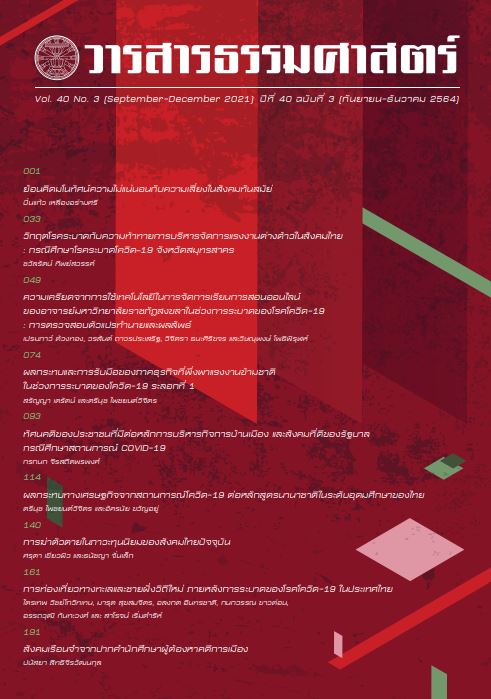The Economic Impact of the COVID-19Situation to International Programs in Higher Education in Thailand
Main Article Content
Abstract
The aim of this paper is to 1) study the effects of COVID-19 pandemic on the tertiary education with international students in Thailand, 2) study the effects of COVID-19 pandemic on teaching and management of the international universities and 3) provide suggestions to minimize negative impacts on tertiary education in Thailand. We used both secondary data and in-depth
interview of executives at 6 international universities throughout Thailand. We interviewed chancellors and head of departments, spreading over a wide range of education levels, locations, and departments. We analyzed information from the interview to understand the effect of COVID-19 pandemic on international students at the different education levels and different universities. We also used the secondary data to calculate economic losses from a reduction of international students.
We found that in the worst-case scenario, if Thailand lost 75% of new international students in B.E. 2563, Thailand will suffer a loss of 706 million baht and if the situation does not return to normal by B.E. 2566 the economic loss will increase to 3,243 million baht. COVID-19 pandemic effects on 4 major areas related to international university which are 1) number of new international students, 2) online teaching for international students, 3) management of the curriculum and 4) the wellbeing of international students living in Thailand.We suggest that international institutions should provide some
form of helps to international students, which are summarized as followed 1) reduction in the
enrolment fees and 2) subsidies for living expenses and 3) support for online learning such as internet connection and effective online courses.
Article Details
References
Charles Ruangthamsing. (2014). The International Student Policy in Thailand and Its Implications on the 2015 ASEAN Economic Community. Southeast Asian Studies in Asia from Multidisciplinary Perspective International Conference (p. 1-7). Kunming, China: Institute of Southeast Asian Studies, Yunnan Academy of Social Sciences, School of Humanities and Social Sciences, Nanyang Technological University and Center for Southeast Asian Studies, Kyoto University.
Laura Alfaro, Lovelaine Basillote, Yogev Gradus, Jeffrey Lamb, Tomer Sharoni, Michael Thng, and Christian Ketels. (2016). Singapore’s Higher Education Cluster. Massachusetts: Harvard Business School. Nitchapat Kitcharern. (2018). Reality and Rhetoric of Changes in Thailand’s University Admission Policy, 1999-2017. Journal of Social Sciences, 117-137
สำนักงานปลัดกระทรวงการอุดมศึกษา วิทยาศาสตร์ วิจัยและนวัตรกรรม. (2561). สถิติอุดมศึกษา. กรุงเทพฯ: บริษัท ซีโนพับลิชชิ่ง แอนด์แพคเกจจิ้ง จำกัด.
สำนักงานสถิติแห่งชาติ. (2562). การสำรวจภาวะเศรษฐกิจและสังคมของครัวเรือน พ.ศ. 2562. กรุงเทพฯ: สำนักงานสถิติแห่งชาติ

